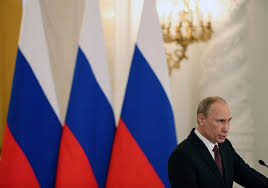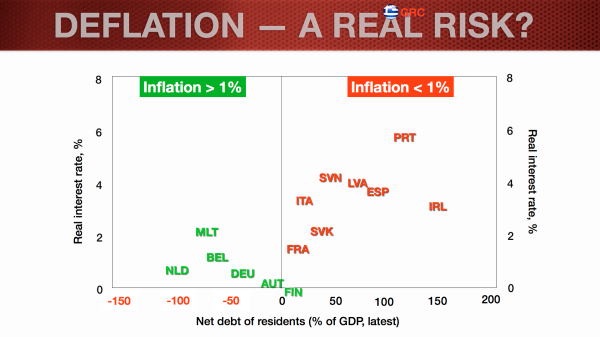Putin is becoming Russia's problem. The West must be rubbing their hands with
satisfaction at the way Putin has shot himself in the foot with his
handling of the Crimea problem.
 Putin is substantially right in his
claim that Russia cannot accept that Crimea, where Russia
has strategic interests and which historically was always Russian
territory, falls under the control of a pro-West Kiev government that brings
NATO right on Russia's doorstep.
Putin is substantially right in his
claim that Russia cannot accept that Crimea, where Russia
has strategic interests and which historically was always Russian
territory, falls under the control of a pro-West Kiev government that brings
NATO right on Russia's doorstep.
Unfortunately for Putin, even when
he is substantially in the right he makes horrendous strategic mistakes which
in the long term jeopardises the prospects of realisation of his dream to
restore to Russia the super-power status it once had. Pity he is
rendering Russia as a pariah rather than a reliable partner.
The following facts, which are
beyond contention, explain why Putin is substantially right to manoeuvre for
Crimea to become Russian territory:
- Annexation with Russia is
what the vast majority of Crimeans want.
- Crimea is historically part of
Russia and was partitioned to Ukraine in 1954 when both Russia and Ukraine
formed part of the Soviet Union - USSR.
- Russia has strategic interest
in Crimea which hosts Russian strategic military assets.
- Russia, though not the super
power it once was is still a formidable military force and strategically
cannot accept the risk of NATO becoming in control of Crimea if Ukraine
moves west and joins NATO (as many other countries under Moscow's
influence during the cold war have done)
- Russia strategically needs a
buffer between its borders and NATO countries.
- Russia has good reason to feel
betrayed when the agreement signed by the Ukraine President Yanukovich and
the representatives of the Kiev Maidan protesters, negotiated with 3 EU
foreign ministers and a representative of the Kremlin, was undone as soon
as it was signed and a new non- elected government took over whilst
elections agreed for December 2014 were brought forward to May 2014.
These are valid reasons to explain
that there is substance in Putin's decision to re-annex Crimea to the Russian
Federation. This extreme move gained further justification by
commitments given by Putin, that Russia will respect the rights of minorities
in Crimea and will allow Ukrainian and Tartar as official languages alongside
Russian in Crimea.
But at the same time the decision
while substantially justified, is strategically wrong for these reasons:
- The method used smacks of
occupation which establishes dangerous precedents which are a risk to
Russia itself for safeguarding its territorial integrity when many of its
eastern regions in the Caucuses have cessation ambitions.
- In 2014 the international
community cannot accept such crass methods of territorial grabs.
- Russia could have achieved
total control of Crimea through diplomacy.
- For safeguarding and
guaranteeing the integrity of the remaining Ukrainian territory
Russia could have extracted guarantees from Ukraine that it will not join
NATO or offer strategic military facilities or rights to NATO.
- Russia could be forced to pay a
high economic price for its undiplomatic liberties when its economy is
still very weak and overly dependent on energy exports.
- USA and the west will be forced
to open an economic strategy to reduce reliance on energy imports from
Russia which in the long term could cripple the Russian economy.
The problem with Putin is that at
heart he remains a KGB man, someone the west cannot trust and cannot do
business with in reciprocal confidence. This event marks his clear
preference for using force rather than diplomacy. He has denied himself acceptance and respect
as a true world leader willing to play by the rules rather than by use of
force.
In the end with China
moving ahead on all fronts to acquire super-power status, Putin should
realise that Russia's long term interests do not lie in fighting the West but
in making Russia as an integral and influential part of the West as with the
world economic centre of gravity moving eastwards, Russia cannot stay in the
middle.
Imagine a different
scenario. Imagine a situation where Russia respects existent sovereign
borders but uses diplomatic channels to demand respect for Russia's military
interests in Crimea and protection of the rights of
Russian minorities in Crimea and Eastern Ukraine. Imagine
a scenario where Russia displays its military power within
the confines of its territorial limits to strengthen its diplomatic
demands.
Within such
strategic positioning Russia would have, rather than diplomatically
isolating itself, found support from core European
countries, especially those countries that rely on
its energy supplies, for a peaceful solution. This would have restored Crimea as
Russian territory against a multilateral guarantee for the territorial
integrity for the rest of Ukraine. Ukraine would have given a commitment not to join NATO, and assurances to give sufficient autonomy and respect to its Eastern regions where
Russian ethnics form a majority. The mildness of the sanctions imposed
for the annexation of Crimea bear witness to the possibility of such diplomatic
solution.
Such a behaviour would
have persuaded the West of Russia’s commitment to play by the rules while
defending its strategic interests. It would have gained for Russia
diplomatic respect and economic stability attracting foreign investment so
necessary for the development of its economy. However by choosing the
undiplomatic military route to force its right Putin has rendered himself an
unreliable partner that cannot be trusted that his ambitions truly stop with
Crimea. Unavoidably the west will be
forced to isolate Russia diplomatically and economically until it crumbles just like the USSR did. The West cannot risk another Munich moment as
with Hitler in 1938.
Putin is still in time
to work back his ambitions through diplomatic channels but only if he shows in
deed not just words his commitment to respect Ukraine territorial integrity
while demanding full respect for rights of
Russia and Russian ethnic
minorites.


